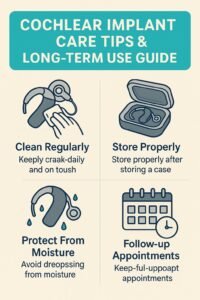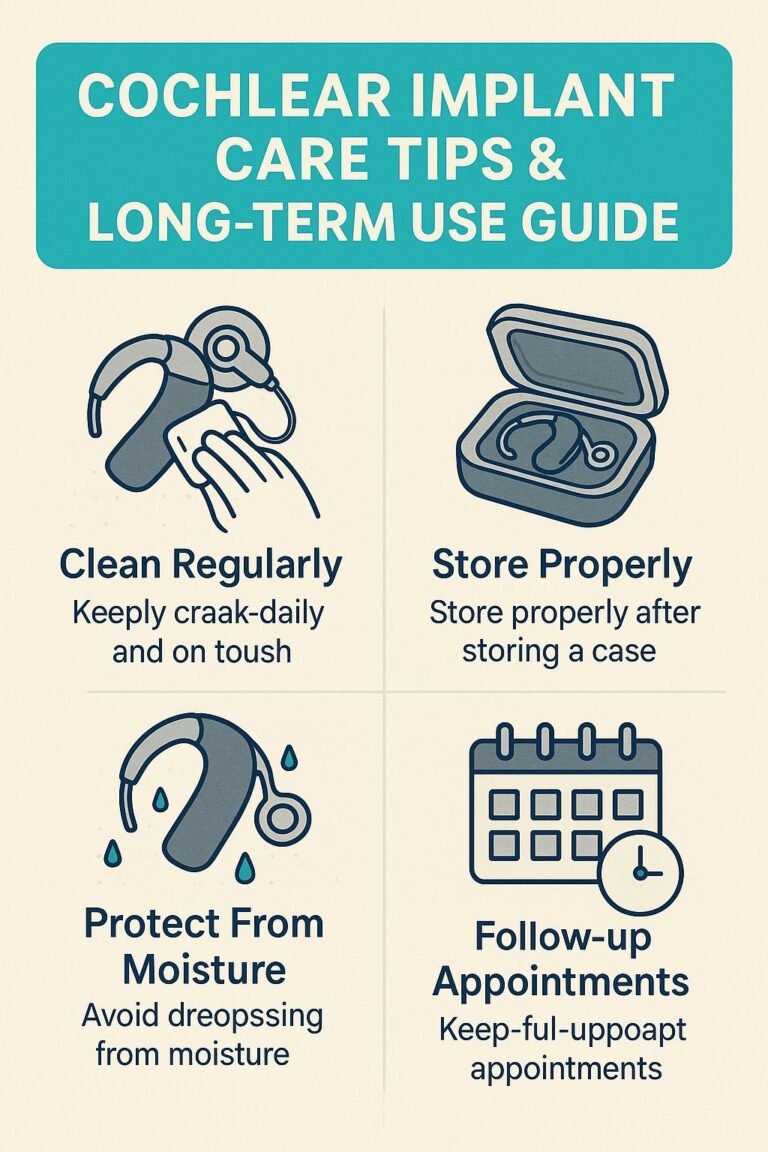Nature is a great source of tools for keeping your eyes in good health. You can find essential nutrients in common foods and make simple changes to your lifestyle to protect your vision naturally. Here are some useful tips for keeping your eyes healthy and your vision clear.
Main Points
- Consuming a diet rich in omega-3s, vitamins C and E, zinc, lutein, and zeaxanthin can drastically lower the risk of age-related vision problems.
- Regular eye check-ups are vital for the early diagnosis and treatment of potential eye issues.
- Exercise is not only good for your overall health but also supports your eye health by promoting blood circulation.
- Protective eyewear, such as sunglasses with UV protection, can prevent damage from harmful sun exposure.
- Limiting screen time and ensuring proper lighting when reading can help to relieve eye strain and fatigue.
Top Tips for Eye Health and Natural Vision Care Solutions
For maintaining the best eye health, it’s critical to include certain nutrients in your diet. These nutrients have a significant role in lowering the risk of common eye diseases and maintaining clear vision.
Crucial Nutrients for Maintaining Eye Health
There are several nutrients our eyes need to work properly and stay in good health. Let’s dive into some of the most crucial ones.
The Role of Vitamins in Eye Health
Vitamins are essential for good vision. For example, Vitamin A is necessary for keeping the cornea, the outside cover of your eye, clear. It also helps in making the pigments in the retina. For a comprehensive understanding of how vitamins and other nutrients impact health, check out this guide on reducing inflammatory diseases through diet.
Oranges, strawberries, and spinach are rich in vitamins C and E, which are potent antioxidants that safeguard your eyes from the harmful effects of free radicals.
Omega-3 Fatty Acids
Omega-3 fatty acids are critical for eye health as they help lower inflammation and maintain the health of the retina. You can find these helpful fats in fish such as salmon, tuna, and sardines. For more information on foods that support your vision, check out this article on foods for eye health.
Studies have shown that a diet rich in omega-3s can help lower the chance of getting dry eyes and age-related macular degeneration (AMD). For more insights into how diet impacts health, explore the latest research on gut health. Try to eat fish at least two times a week to get the most out of it.
Where to Find Lutein and Zeaxanthin
Lutein and zeaxanthin are antioxidants that are essential for the health of your eyes. They work by filtering out harmful high-energy blue wavelengths of light, and they also help to keep the cells in your eyes healthy. Including high-fiber fermented foods in your diet can also support overall eye health by reducing inflammation.
Dark green leafy vegetables like kale and spinach, as well as other foods such as eggs and corn, are rich in these nutrients. Incorporating these foods into your diet can help enhance your vision and lower the risk of chronic eye diseases.
Healthy Routines for Better Vision
Aside from eating a healthy diet, there are other habits that can greatly affect your eye health. By including these habits in your everyday routine, you can safeguard your eyes and improve your vision.
Consistent Eye Check-ups
Having consistent eye check-ups is one of the best things you can do for the health of your eyes. These check-ups can find issues early on, making treatment more effective. Additionally, maintaining a healthy lifestyle, such as following a diet rich in high-fiber fermented foods, can support overall eye health and reduce the risk of inflammatory diseases.
First and foremost, routine exams can spot diseases like glaucoma, diabetic retinopathy, and macular degeneration that frequently don’t have any symptoms.
The Link Between Exercise and Eye Health
Exercise is not only good for your body, but it’s also great for your eyes. Regular physical activity boosts blood circulation, which helps increase the oxygen supply to your eyes and aids in the removal of toxins. For more insights, explore the global health trends that highlight the importance of exercise in maintaining overall well-being.
Even basic exercises like walking or yoga can help improve your eye health. Try to get at least 30 minutes of moderate exercise on most days of the week to keep your eyes healthy.
Food Choices for the Best Eye Health
What you eat can have a big impact on your eye health. Some foods are full of nutrients that help keep your eyes healthy. You can support your vision naturally and lower your chances of getting eye diseases by making smart food choices. Additionally, maintaining optimal daily water intake can also contribute to overall eye health.
Dark Greens and Bright Veggies
Dark greens such as spinach, kale, and collard greens are packed with lutein and zeaxanthin, two antioxidants that are crucial for eye health. They work by shielding the eyes from harmful light and oxidative stress.
Furthermore, vibrant vegetables like carrots and bell peppers are loaded with beta-carotene, a substance that your body transforms into vitamin A—an essential nutrient for preserving good eye health. By including a range of these vegetables in your diet, you can provide your eyes with the care they need.
How Fruits and Nuts Affect Your Eyesight
Oranges, strawberries, and kiwi are all packed with vitamin C, which is an antioxidant that keeps the blood vessels in your eyes healthy. Eating these fruits on a regular basis can help prevent cataracts and slow down the advancement of age-related macular degeneration.
Almonds and sunflower seeds, among other nuts and seeds, are rich in vitamin E. This antioxidant is known to safeguard the cells in your eyes from harm. Consuming a handful of nuts every day can lead to improved eye health in the long run.
Eat Fish and Foods High in Omega-3
Fish like salmon, mackerel, and sardines are rich in omega-3 fatty acids, which are critical for retinal health. These beneficial fats also help to decrease inflammation and may reduce the risk of dry eyes and macular degeneration.
If you’re not a fan of fish, you can still get your omega-3s from plant-based sources like flaxseeds and chia seeds. Adding these to your meals can help keep your eyes well-nourished and healthy.
Nature’s Solutions for Eye Health
In addition to a healthy diet, there are natural ways to support your vision and overall eye health. These solutions can include herbal supplements, eye exercises, and changes to your environment.
The Role of Herbal Supplements
Herbal supplements can be a great addition to your routine for maintaining eye health. Take Bilberry, for instance. It’s been shown to enhance night vision and lessen eye strain. Plus, it’s packed with antioxidants that shield your eyes from harm.
Ginkgo biloba is another widely used supplement, known for its ability to boost blood flow to the eyes and promote eye health. Before incorporating any supplements into your regimen, always check with a healthcare provider to make sure they’re suitable for you.
Exercises to Strengthen Eye Muscles
Similar to the rest of the muscles in your body, exercising your eye muscles can be beneficial. Regular eye exercises can help improve focus, decrease eye strain, and improve overall eye health. Additionally, maintaining a balanced diet can also contribute to eye health, as suggested by recent research on gut health.
A great exercise is the “20-20-20” rule: every 20 minutes, take a 20-second break and look at something 20 feet away. This helps to relax the eye muscles and avoid tiredness.
Adjusting Your Environment for Better Eye Health
Adjusting your environment can also help improve your eye health. Make sure your workspace is well-lit to reduce glare and prevent eye strain.
Think about using an anti-glare screen on your computer and adjusting the brightness settings to a comfortable level. These minor adjustments can significantly improve your eye health.
Everyday Habits for Keeping Your Eyes Healthy
Adding specific habits to your daily routine can help keep your eyes healthy and even improve your vision. These habits aim to decrease strain and give your eyes the care they require.
One key habit is controlling your screen time. Spending too much time in front of screens can result in digital eye strain, so it’s crucial to take breaks regularly and blink frequently to keep your eyes hydrated.
Moreover, keeping yourself hydrated is essential for maintaining good eye health. Drinking enough water helps keep your eyes moisturized and lessens the chance of getting dry eyes. For more information on how much water you should be drinking daily, check out these optimal daily water intake guidelines.
Managing Time Spent on Screens
With the rise of the digital age, we find ourselves spending a large portion of our time looking at screens, whether for work, school, or fun. This can lead to what’s known as digital eye strain, which can cause discomfort and tiredness. One good way to manage the time you spend looking at screens is to follow the “20-20-20” rule: every 20 minutes, take a break for 20 seconds and look at something 20 feet away. This simple exercise can help relax your eye muscles and reduce strain. Additionally, maintaining a healthy diet with high-fiber foods can also support overall eye health.
Furthermore, you can make your viewing experience more comfortable by adjusting the brightness and contrast settings on your devices. To avoid straining your eyes, you can use an anti-reflective screen protector to reduce glare and place your monitor at eye level. Don’t forget to blink often to keep your eyes hydrated and prevent them from drying out.
By making these practices a part of your daily routine, you can greatly lower your chances of suffering from digital eye strain and keep your vision healthy for a long time.
The Importance of Hydration
Keeping your body hydrated is crucial for your overall health, and this includes the health of your eyes. By staying hydrated, you can help to maintain the balance of moisture in your eyes, which can reduce the chances of you suffering from dry eyes and irritation. Try to drink at least eight glasses of water each day to keep both your body and your eyes hydrated.
Aside from drinking water, you can also get your hydration from foods that are high in water content. This includes cucumbers, watermelon, and oranges. When your body is hydrated, it ensures that your eyes have enough moisture to function properly and stay comfortable.
The Advantages of Getting Enough Sleep
Getting enough sleep is essential for maintaining good eye health. Your eyes rest and repair during sleep, which is vital for maintaining clear vision and reducing eye strain. Make sure to get 7-9 hours of quality sleep each night to provide your eyes with the rest they need. For more tips on maintaining good eyesight, visit WebMD’s guide to good eyesight.
Common Questions
Eye health is a common concern and many people have questions about how to best take care of their eyes. In this section, we’ll tackle some of the most frequently asked questions and provide straightforward answers to help you keep your eyes healthy. For more information, you can explore foods for eye health to naturally protect your vision.
How frequently should I get my eyes checked?
Regular eye check-ups are crucial to catch any potential vision issues at an early stage. Adults should ideally get a complete eye check-up every 1-2 years. However, children and those with existing eye conditions might need to get their eyes checked more often. You should discuss with your eye care professional to figure out the best schedule that suits your needs.
What should I eat for good eye health?
Leafy greens, vibrant vegetables, fruits, and foods high in omega-3 fatty acids are all fantastic for your eyes. Eating foods such as spinach, kale, carrots, oranges, and fatty fish like salmon can provide the nutrients your eyes need to stay healthy.
By incorporating a diverse range of these foods into your diet, you can guarantee that your eyes are receiving the necessary nutrients to function at their best, and you can reduce the likelihood of developing age-related eye conditions.
Is it possible to enhance my vision through exercises?
Exercises aren’t capable of rectifying refractive mistakes such as myopia or hypermetropia, but they can assist in enhancing the strength of your eye muscles and reducing strain. Practices like concentrating on distant items, blinking frequently, and adhering to the “20-20-20” guideline can aid in preserving overall eye health.
Doing these exercises regularly can help relieve any discomfort and enhance your ability to focus, making them a great addition to your eye care routine.
Remember, eye exercises are not a replacement for glasses or medical treatment, but they can enhance other eye care routines.
Can I treat dry eyes at home?
Indeed, there are a few home remedies that can help to soothe dry eyes. Applying a warm compress to your eyes can stimulate oil glands in your eyelids, which can improve the quality of your tears. Over-the-counter artificial tears can also help by keeping your eyes moisturized. For maintaining overall eye health, it’s important to consider your optimal daily water intake to ensure your body is well-hydrated.
Moreover, having a humidifier in your house can increase the humidity in the air, which can decrease the chance of having dry eyes. Don’t forget to take frequent breaks from looking at screens and to blink a lot to keep your eyes moist.
What impact does blue light have on my eyes?
Blue light, which is produced by digital screens, can cause digital eye strain and interfere with your sleep patterns. Extended exposure to blue light can result in discomfort and tiredness.
Consider using blue light filtering glasses or screen protectors to reduce your exposure to blue light. You could also adjust your device’s display settings to emit less blue light, particularly in the evenings. This can help to protect your eyes and improve the quality of your sleep. Additionally, incorporating high-fiber fermented foods into your diet may support overall eye health and reduce inflammation.










